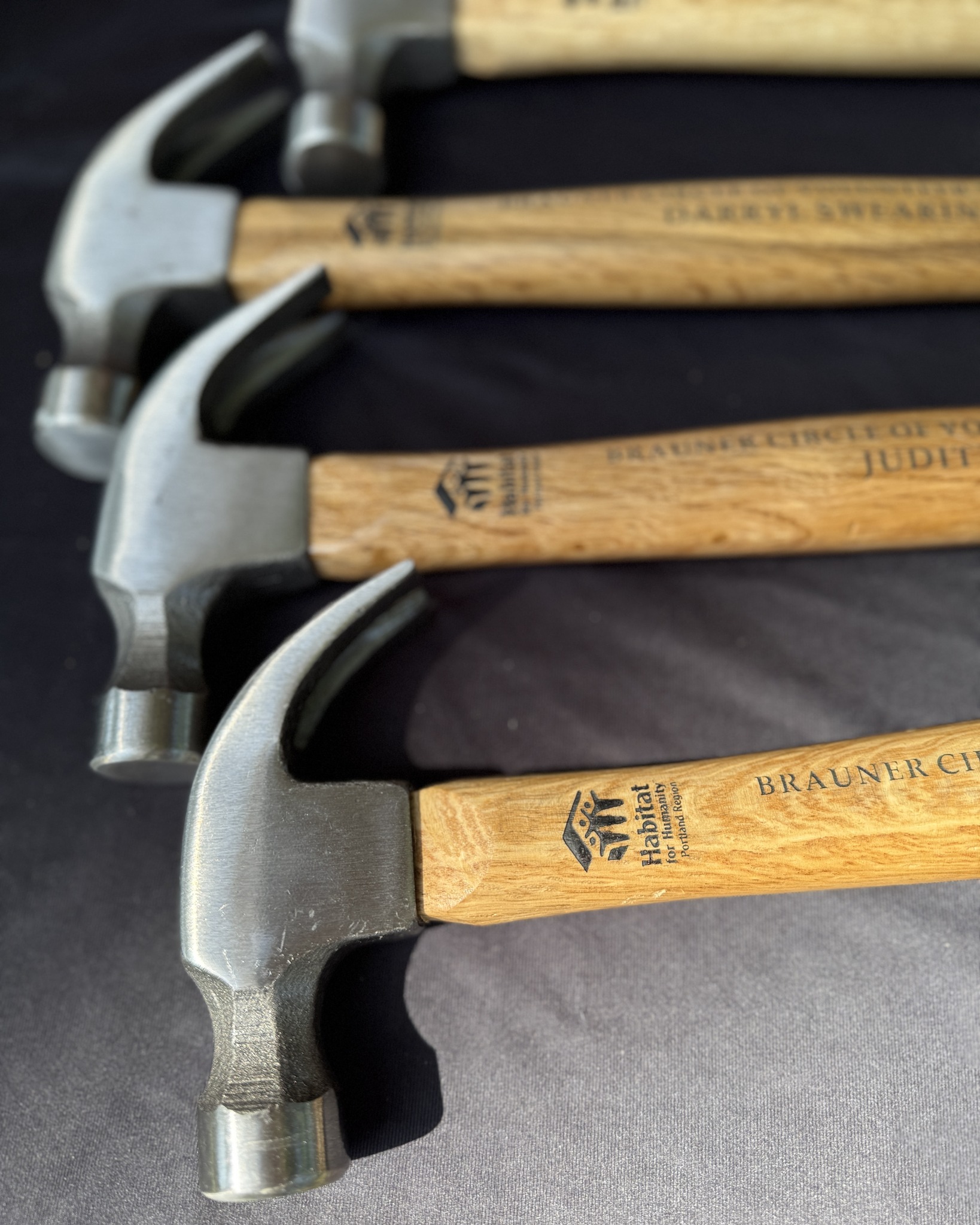In the back room of the Clark County Habitat Store, Chuck Johnson and a team of volunteers resuscitate neglected, sometimes crusty, power tools and equipment and make them hum again.
Volunteering is something Chuck first learned to love as a young boy.
“I’ve always volunteered – ever since I was a child doing something,” he recalled “Dad was with the DFW Post—the commander. So from the time I was 8 to 10 he couldn’t go out the door without me.”
That included setting up for spaghetti dinners, washing floors, cleaning bathrooms, washing dishes and anything else that would keep him close to his father.
His favorite stint?
Chuck answers without hesitation: “Selling Christmas trees as a kid at the VFW post on Foster Boulevard! I had so much fun out there with all those old WWII veterans. And it was nice as a young kid, they let me in as a young man on the stories that most WWII veterans will not talk about…And just sitting around with them and being considered part of the group of men, even as a 10, 11, 12-year-old kid. I’ve always been drawn to older individuals. I always knew that was where the knowledge was, even as a youngster. I mean I was pretty excited. It was neat that they could open up and talk, and I could ask them questions–even though I know it wasn’t easy. It was good. It was good.”
At the Habitat Store Chuck uses his acquired knowledge repairing lawnmowers, table saws, joiners, and chainsaws.
“Chainsaws are a pain in the right quadrant,” he snarks. But he’s serious about cleaning away yard sludge and rust, cleaning, fixing or repairing the carburetor, waxing a lawnmower deck, or whatever else it takes to get the donated item back in prime working order and on the sales floor with a “Tested” sticker slapped on its side.
Lawnmowers are what they get most.
“Lawnmowers are a lot of fun,” Chuck said. “I just fixed a Troy-Bilt riding lawnmower – quite an expensive lawnmower. $1500 to $1600 at Lowe’s. It was a simple thing – in fact I’m sort of embarrassed to say how simple it was.”
Before it hit the stage, he also had to change a flat tire – but that was pretty much at cost, Chuck said, thanks to Richey’s [Tire Factory].
Chuck’s to-do list
– New tire
– Cleaned
– Tightened the battery cables
– Removed corrosion
“It was a simple fix,” Chuck beams. “The most simple thing I’ve ever done. Now I have it out there for $450.”
Cleaning up carburetors, replacing spark plugs, maybe replacing a gasket, giving it the old spit shine with a bucket of water and a bit of elbow grease – this is what keeps Chuck busy at the Habitat Store. And he’s not complaining because his work keeps materials out of landfills, makes for affordable purchases and raises money for Habitat for Humanity.
A little lawnmower love goes along way
But still Chuck would like to pass on a bit of advice that could keep your equipment working better and longer.
Chuck’s lawnmower-saving tips
1. Let the gas run out (Start it up, put a zip tie on the handle and let it the gas run out.)
2. Change the oil
3. Change the air filter
4. Power wash it top and bottom (Clean out the gunky grass clippings)
5. Sharpen the blade (Chuck keeps two to alternate)
6. Wax the deck (car wax works)
Chuck is adamant that one should change everything out and get things nice and spiffy at the end of the season each fall. That way when the sun breaks out again in the spring and you’re ready to rock and roll, so is your lawnmower. The thing is, this kind of post-season maintenance can keep the motor on your mower going for 10 years, even on a cheaper model.
“A curiosity to learn”
What if the engine is beyond rescue? Of course some of donated power tools can’t make the grade. In that case, reusable components are harvested; the remainder goes into the metal recycling bin. Still there is value beyond that.
“If it’s broken, tear it apart,” said Chuck. “See how it works. See what teething is. Tear that little small engine apart. How’s this thing actually work. Play with it a little bit…You know if you take a $1500 riding lawnmower and you put it in metal recycling you still aren’t going to get a lot of money out of that.”
So why not learn something from it first, is Chuck’s point. When he began volunteering at the Habitat Store 7 years ago, Chuck didn’t know diddly about repairing power tools. “But I had a curiosity to learn,” Chuck claims. So volunteer Leroy Zent taught him. And though Leroy moved to Montana three months ago, Chuck says he still has Leroy’s number on speed dial. When stumped they’ll brainstorm, pull out the Briggs & Stratton carburetor book, compare notes, or consult with others in the backroom of the Habitat Store.
“Hey, it’s not all about me,” Chuck protests. “There’s a team of us! It’s about a group of men [and one woman in recycling] who are having a blast down here, who are just kicking the crap out of each other—which we do—we rib each other terribly, but we all work together!”
From the Clark County Habitat Store, Chuck will soon begin training other ReStore volunteers interested in small engine repair so more power tools and equipment can be refurbished and reused. You’ll find it’s all in the label: Tested. You can count on it.
MORE ABOUT CHUCK
—“The fun vintage things are the table saws, the joiners. I still have my father’s 1948 Atlas 8 1/4” table saw that help build a four-bedroom cabin up in Lake Merwin, helped remodel my great-grandmother’s house I grew up in, over on SE Harold. His drill press, his joiner, they’re timeless machines.”
—“People can teach me more than I can teach you because you’ve seen things in your life that I have never seen, and I will never see.”
—Still takes his former elementary school teacher out to lunch. “I credit her with where I am today.”
—Retired. Thrivet Financial.
RELATED:
VOLUNTEER: We’ve got a place for you!
DONATE: Your old stuff looks pretty good to us!
SALVAGE SERVICE: We do deconstruction!



